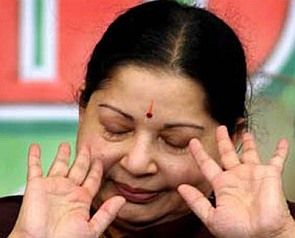Could Jayalalithaa remain a defendant to enable the recovery and return of the disproportionate assets in case the high court judgment is overturned?
Sayan Ghosal reports.
 Just weeks after the death of Jayalalithaa, who died as chief minister of Tamil Nadu, the legal community is split on how her two-decade-old disproportionate assets case will unfold.
Just weeks after the death of Jayalalithaa, who died as chief minister of Tamil Nadu, the legal community is split on how her two-decade-old disproportionate assets case will unfold.
The case is in the final stages with the Supreme Court to pronounce its verdict.
The co-accused in the case are J Elavarasi, V Sudhakaran and Jayalalithaa's 'dear sister' N Sasikala, who, along with the former chief minister, were convicted by a special court on grounds of corruption and conspiracy, but acquitted by the Karnataka high court. Subsequently, the Karnataka government approached the Supreme Court.
After the Supreme Court raised objections on various issues, including Karnataka's locus standi in an internal matter of another state, Justice P C Ghose and Justice Amitava Roy reserved its verdict on the case in June.
The matter has become more contentious after Jayalalithaa's death on December 5.
Some legal experts say the appeal process is bound to be abated (nullified) as a result of the death of the main accused (Jayalalithaa) while others have expressed the view that the verdict could be pronounced against only the co-accused.
It is also speculated that Jayalalithaa could remain a defendant to enable the recovery and return of the disproportionate assets in case the high court judgment is overturned.
According to the Code of Criminal Procedure, all statutory appeals must abate with the death of the accused.
Senior advocates Indira Jaising and Manish Tiwari of the Supreme Court say the case against the former chief minister must come to a close and her assets, whether disproportionate or not, cannot be subject to scrutiny or repatriation.
"As the appeal is a continuation of the original matter, the case against Jayalalithaa abates, though it can continue against the co-accused," Jaising said. However, there is a catch here.
The Supreme Court had in State (through CBI) v Jitender Singh concluded that the death of a sole public official could not cause an entire series of proceedings to vacate, as in that case the entire object and purpose of the Prevention of Corruption Act would be defeated.
"Normally, criminal proceedings abate with the death of the accused, but in cases involving a pecuniary orientation, the legal heirs are brought on record and the matter continues. As the state (of Tamil Nadu) still stakes a claim on assets, the judgment has to be pronounced on merits," noted Kamini Jaiswal, senior advocate, Supreme Court.
Even the former advocate general of Karnataka and special public prosecutor in the case, B V Acharya, is of the view the case will continue.
Some legal experts are, however, not sure whether the appeal will continue against even the co-accused.
Questions have been raised as to whether the charges of abetment and criminal conspiracy can be substantiated without the trial of the prime accused.
In such a situation, whether the matter can proceed in its present form or is liable to be re-tried is yet another question that the Supreme Court verdict must address if it determines that the proceedings against Jayalalithaa are to abate.












 © 2025
© 2025